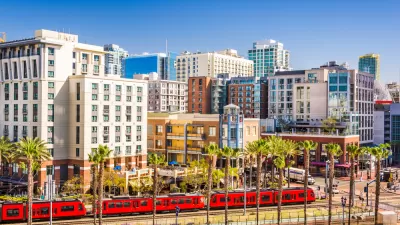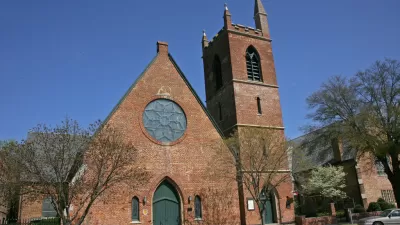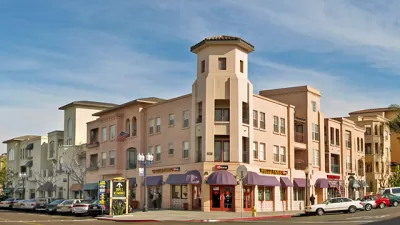In a rebuff to proponents of local control, a California state appeals court upheld a 1979 law that allows developers to bypass local zoning regulations when including affordable housing in their projects.

In a 3-0 ruling, a state appeals court in California upheld a 1979 density bonus law that allows developers who include affordable housing in their projects to claim exemption from local zoning rules and restrictions. As Bob Egelko reports, the court affirmed the goals of the law, which is designed to incentivize affordable housing construction.
According to the court, "Once the developer commits to making a specified portion of the project affordable to lower-income households, 'local government must allow increased building density, grant permits, and waive any conflicting local development standards unless certain limited exceptions apply,' Justice Judith Haller said in the 3-0 ruling."
Opponents of the decision such as Everett DeLano, lawyer for the Bankers Hill/Park West Community Association, say the ruling "seems be saying that if you have a density-bonus project, you can do whatever you want," removing local control.
The development at the heart of this case is a 20-story, 204-unit building under construction at the edge of San Diego's Balboa Park, in which the developer plans to include 18 affordable units. Local opponents expressed concern about views, shade, and potential interference with airport flight paths. The court's decision to uphold the state law could mark a shift toward less local control and stricter enforcement of the state's affordable housing mandates.
FULL STORY: Court upholds density bonus law that exempts certain housing projects from local restrictions

Planetizen Federal Action Tracker
A weekly monitor of how Trump’s orders and actions are impacting planners and planning in America.

Map: Where Senate Republicans Want to Sell Your Public Lands
For public land advocates, the Senate Republicans’ proposal to sell millions of acres of public land in the West is “the biggest fight of their careers.”

Restaurant Patios Were a Pandemic Win — Why Were They so Hard to Keep?
Social distancing requirements and changes in travel patterns prompted cities to pilot new uses for street and sidewalk space. Then it got complicated.

Platform Pilsner: Vancouver Transit Agency Releases... a Beer?
TransLink will receive a portion of every sale of the four-pack.

Toronto Weighs Cheaper Transit, Parking Hikes for Major Events
Special event rates would take effect during large festivals, sports games and concerts to ‘discourage driving, manage congestion and free up space for transit.”

Berlin to Consider Car-Free Zone Larger Than Manhattan
The area bound by the 22-mile Ringbahn would still allow 12 uses of a private automobile per year per person, and several other exemptions.
Urban Design for Planners 1: Software Tools
This six-course series explores essential urban design concepts using open source software and equips planners with the tools they need to participate fully in the urban design process.
Planning for Universal Design
Learn the tools for implementing Universal Design in planning regulations.
Heyer Gruel & Associates PA
JM Goldson LLC
Custer County Colorado
City of Camden Redevelopment Agency
City of Astoria
Transportation Research & Education Center (TREC) at Portland State University
Camden Redevelopment Agency
City of Claremont
Municipality of Princeton (NJ)





























